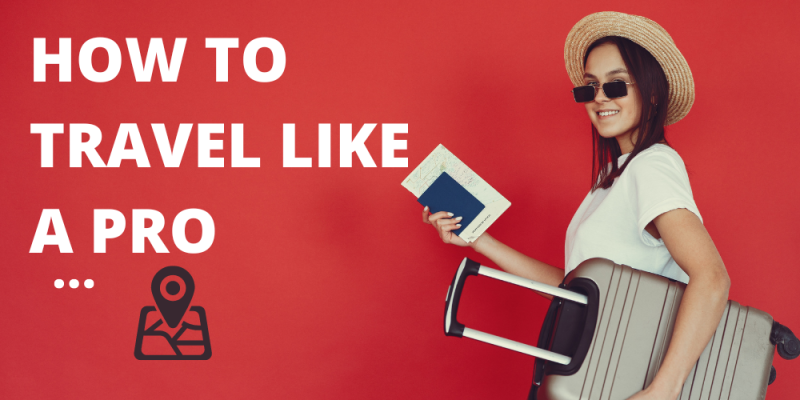Introduction
Are you gearing up for an exciting road trip? The open road, picturesque landscapes, and the thrill of adventure await you. But before you embark on this memorable journey, it’s crucial to ensure you have everything you need for a comfortable and hassle-free experience. That’s why we’ve compiled a comprehensive list of the top 5 essentials you must pack for your road trip. From luggage choices to hygiene supplies, and entertainment options to safety equipment, we’ve got you covered.

At the heart of every successful road trip lies careful planning and organization. Packing the right essentials can make all the difference between a smooth ride and unexpected challenges along the way. By prioritizing these must-have items, you can focus on enjoying the scenic routes, exploring hidden gems, and creating lifelong memories.
So, fasten your seatbelts as we dive into the world of road trip essentials and uncover the top 10 items you should never forget to pack.
1. Choosing the Right Luggage
A road trip is an adventure that calls for careful planning, and one crucial aspect is choosing the right luggage. The right bags or suitcases can make a significant difference in terms of convenience, organization, and overall enjoyment of your journey.

a. Assess Your Needs and Trip Duration:
Before diving into the vast world of luggage options, it’s essential to assess your specific needs and the duration of your road trip. Consider factors such as the number of travelers, the available space in your vehicle, and the length of your journey. This evaluation will help you determine the size, type, and quantity of luggage you require.
b. Opt for Versatile and Durable Luggage:
When it comes to road trips, versatility and durability are key. Look for luggage that is designed to withstand the rigors of travel, such as sturdy materials like nylon or polycarbonate. Additionally, choose bags that offer flexibility in terms of storage compartments, expandable features, and adjustable straps. This way, you can easily adapt your luggage to accommodate varying amounts of clothing, souvenirs, and other items you may collect along the way.
c. Consider Your Travel Style:
Think about your travel style and preferences. If you enjoy easy access to your belongings during the trip, consider opting for a backpack or a duffel bag with multiple pockets and compartments. These types of bags are excellent for storing frequently used items, such as snacks, cameras, or maps. On the other hand, if you prefer a more organized approach, traditional suitcases with compartments and dividers may be a better fit.
d. Wheels or No Wheels:
Road trips often involve navigating through different terrains, including airports, hotels, and uneven surfaces. Choosing luggage with wheels can significantly ease the burden of carrying heavy bags and enhance your mobility. Look for bags with sturdy, multidirectional wheels that can handle various surfaces effortlessly. However, if you prefer the flexibility of carrying your bags, backpacks or duffel bags with comfortable straps may be a better option.
e. Pack Efficiently and Maximize Space:

Once you’ve selected the right luggage, it’s crucial to pack efficiently and maximize the available space. Roll your clothes instead of folding them to save space and prevent wrinkles. Utilize packing cubes or compression bags to further optimize space and keep items organized. Remember to distribute weight evenly throughout your luggage to maintain balance and stability during transit.
f. Secure Your Belongings:
Safety is paramount when traveling, so consider luggage that offers secure features. Look for bags with TSA-approved locks or built-in combination locks to protect your belongings. Additionally, choose bags with reinforced corners and sturdy zippers to prevent accidental openings and damage to your items.
2. Clothing Essentials
Embarking on a road trip is an exhilarating adventure filled with beautiful landscapes, exciting destinations, and unforgettable memories. But to ensure a comfortable and enjoyable experience, packing the right clothing essentials is crucial.
a. Dressing for Weather Versatility:

When packing for a road trip, it’s essential to consider the unpredictable nature of weather. Choose clothing pieces that can easily adapt to different temperatures and weather conditions. Opt for lightweight layers, such as t-shirts, long-sleeved shirts, and versatile jackets or cardigans. These items will allow you to easily add or remove layers as needed, keeping you comfortable throughout your journey.
b. Comfortable and Versatile Bottoms:
Select bottoms that offer both comfort and versatility. Pack a pair of jeans or pants that are comfortable for long drives and can be dressed up or down. Additionally, include a pair of shorts for warmer days and comfortable leggings or joggers for ultimate relaxation during pit stops or campfire evenings.
c. Appropriate Footwear:

The right footwear is essential for road trips, as you’ll be spending a significant amount of time on your feet exploring new places. Opt for a pair of comfortable walking shoes or sneakers that provide support and cushioning. If you plan to engage in outdoor activities, consider packing hiking boots or sandals for added versatility.
d. Weatherproof Outerwear:
Regardless of the season, it’s important to be prepared for unexpected weather changes. Pack a lightweight, weatherproof jacket that can withstand rain showers or windy conditions. Additionally, consider carrying a compact umbrella or a packable raincoat for extra protection against sudden downpours.
e. Swimwear and Beach Essentials:
If your road trip includes beach destinations or visits to lakes, don’t forget to pack your swimwear. Whether it’s a one-piece swimsuit, bikini, or swim trunks, be prepared to take a refreshing dip. Remember to pack a beach towel, sunscreen, and a beach cover-up for added convenience and sun protection.
f. Accessories for Added Comfort:
Accessories can make a significant difference in your comfort and overall experience during a road trip. Remember to pack a wide-brimmed hat or cap to shield yourself from the sun. Sunglasses are essential to protect your eyes from harmful UV rays. Don’t forget to bring a scarf or bandana, as they can be used as versatile accessories to protect your face from dust, as a headband, or even as a makeshift mask.
3. Hygiene and Toiletries
Road trips are exciting adventures filled with unforgettable experiences. However, it’s essential to prioritize hygiene and personal care to ensure a comfortable and enjoyable journey.
a. Toiletries for Daily Cleanliness:
When it comes to maintaining personal hygiene, the following toiletries are a must-pack:

i. Toothbrush and toothpaste: Keep your pearly whites clean and fresh throughout your journey.
ii. Soap or body wash: Opt for travel-sized options or solid bars for convenience.
iii. Shampoo and conditioner: Pack small bottles or consider using solid shampoo bars.
iv. Deodorant: Stay odor-free even on long drives by packing your preferred deodorant or antiperspirant.
v. Hairbrush or comb: Tame your locks and keep them looking presentable.
b. Skincare and Sun Protection:
Protecting your skin from the sun and maintaining its health is crucial during road trips:
i. Sunscreen: Shield your skin from harmful UV rays by packing a broad-spectrum sunscreen with an SPF of 30 or higher.

ii. Lip balm with SPF: Prevent dry and chapped lips while providing additional sun protection.
iii. Moisturizer: Keep your skin hydrated by packing a lightweight, non-greasy moisturizer.
iv. Wet wipes: Freshen up and remove dirt and sweat with disposable wet wipes.
v. Hand sanitizer: Ensure cleanliness by carrying hand sanitizer for situations where soap and water are unavailable.
c. Menstrual Hygiene:
For individuals who menstruate, it’s essential to be prepared during your road trip:
i. Menstrual products: Pack an adequate supply of tampons, pads, or menstrual cups, depending on your preference.
ii. Wet bag or pouch: Carry a waterproof bag or pouch to discreetly store used menstrual products until disposal.
d. Insect Repellent:
Protect yourself from pesky bugs and insects that may interfere with your road trip enjoyment:
i. Insect repellent: Choose a repellent with active ingredients like DEET or picaridin to ward off mosquitoes and other insects.
ii. Bug bite relief: Bring itch-relief creams or soothing balms for any bug bites you may encounter.
e. Personal Care Extras:
Don’t forget these additional items that can enhance your personal care routine:
i. Nail clippers and file: Keep your nails neat and tidy while on the road.
ii. Disposable razors: Pack disposable razors or electric shavers for a quick touch-up.
iii. Cotton swabs and cotton pads: Useful for makeup removal, applying ointments, or cleaning small areas.
iv. Travel-sized laundry detergent: Prepare for laundry emergencies by carrying a small amount of detergent.
4. First Aid and Medications
Road trips are exhilarating adventures, offering the freedom to explore new places and create unforgettable memories. However, unexpected situations can arise, making it crucial to be prepared for any bumps along the way. One aspect that should never be overlooked is first aid and medications.
a. The Importance of a First Aid Kit

i. Be ready for emergencies: Road trips can take us to remote areas where immediate medical assistance might be limited. A well-equipped first aid kit ensures you can handle minor injuries and provide initial care until professional help is available.
ii. Address common ailments: Headaches, allergies, and minor cuts or bruises are common occurrences during a road trip. Having essential items like pain relievers, antihistamines, and band-aids on hand allows you to tackle such issues promptly and continue your journey.
iii. Peace of mind: Knowing you have a comprehensive first aid kit instills confidence, making you feel prepared for the unexpected. It eliminates the anxiety of being caught off-guard and allows you to focus on enjoying your adventure.
b. Essential Items for Your First Aid Kit
i. Bandages and dressings: Include a variety of band-aids, sterile gauze pads, adhesive tape, and bandage wraps to treat cuts, blisters, and other wounds.
ii. Antiseptic solutions: Carry antiseptic wipes or solutions to clean wounds and prevent infections.
iii. Medications: Include pain relievers, antihistamines, and anti-diarrheal medications. If you or your travel companions have specific medical conditions, pack relevant prescription medications.
iv. Tweezers, scissors, and gloves: These tools are invaluable for wound care and general first aid procedures.
v. Cold and hot packs: Provide instant relief for sprains, strains, or bumps.
vi. CPR mask and emergency phone numbers: Include a CPR mask for CPR procedures and a list of emergency contact numbers.
c. Medications and Personal Health
i. Prescription medications: Ensure an adequate supply of prescribed medications for the duration of your trip, including any necessary refills. Keep them in their original packaging, along with prescription labels and accompanying documents.
ii. Over-the-counter medications: Pack remedies for common ailments such as headaches, allergies, motion sickness, and indigestion.
iii. Personal health items: If you have specific health conditions, pack items such as insulin, inhalers, or allergy auto-injectors, ensuring they are easily accessible when needed.
iv. Medication storage: Store medications in a cool and dry place, away from direct sunlight. Avoid leaving them in the glove compartment, as extreme temperatures can affect their efficacy.
d. Tips for First Aid and Medication Preparedness
i. Check expiration dates: Regularly review your first aid kit and medication supplies to ensure everything is up to date. Replace expired items promptly.
ii. Familiarize yourself with the contents: Understand how to use the items in your first aid kit. Consider taking a basic first aid or CPR course to enhance your knowledge and confidence in emergency situations.
iii. Customize for specific needs: If you or your travel companions have specific medical conditions or allergies, tailor your first aid kit and medications accordingly.
iv. Store securely: Keep your first aid kit and medications in a sturdy and easily accessible container. Ensure it is stored safely to prevent damage or spillage during the journey.
5. Entertainment and Electronics
Are you gearing up for an exciting road trip? As you pack your bags and plan your itinerary, don’t forget to consider the entertainment and electronics that will enhance your journey. In this blog post, we’ll explore the must-have items to keep you entertained, connected, and capturing memories throughout your road trip adventure.
a. Portable Entertainment Options:

i. Books: Pack a selection of your favorite books or try out new genres to keep you engaged during long stretches on the road.
ii. Magazines or Comics: Lighter reading materials like magazines or comics are great for quick entertainment breaks.
iii. Audiobooks and Podcasts: Enjoy the pleasure of storytelling while driving by downloading audiobooks or engaging podcasts.
iv. Portable Games: Bring along travel-sized board games or handheld consoles to keep everyone entertained during pit stops or downtime.
b. Music and Podcasts:
i. Create Road Trip Playlists: Curate playlists that cater to various moods and genres to make your road trip soundtrack memorable.
ii. Podcasts: Discover entertaining and educational podcasts to engage your mind during the journey.
iii. Bluetooth Speaker: Enhance the audio experience by bringing a portable Bluetooth speaker for better sound quality.
c. Capture Memories:

i. Digital Camera: Preserve the beautiful landscapes, memorable moments, and funny incidents by carrying a quality digital camera.
ii. Smartphone with a Good Camera: If you prefer a more lightweight option, ensure your smartphone has a good camera to capture high-quality photos and videos.
iii. Selfie Stick or Tripod: Capture group photos or steady videos using a selfie stick or tripod to avoid blurry shots.
d. Stay Connected:
i. Smartphone: Keep your smartphone fully charged and utilize it for navigation, communication, and access to helpful travel apps.
ii. Car Charger: Invest in a reliable car charger to keep your devices powered up throughout the trip.
iii. Portable Wi-Fi Hotspot: Stay connected even in remote areas by using a portable Wi-Fi hotspot or tethering your smartphone.
e. Emergency and Safety Electronics:
i. Roadside Emergency Kit: Ensure you have a fully stocked roadside emergency kit, including items like a flashlight, spare batteries, and jumper cables.
ii. GPS or Navigation Device: Carry a dedicated GPS unit or use navigation apps on your smartphone for accurate directions.
iii. Portable Power Bank: Keep a portable power bank handy to charge your devices in case of emergencies or when outlets are unavailable.
For More – Read How to Travel Like a Pro?





